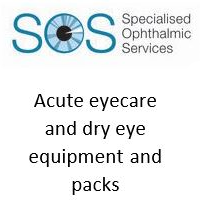Ophthalmology and OMPs
How poor vision affects our wellbeing
New study keeps eye on Mental Health
How poor vision affects our wellbeing
A new study1 reveals the mental toll of poor eyesight, as over half of British adults (54 per cent) state that having poor vision can cause anxiety and 55 per cent can feel in a low mood if they cannot see clearly2.
The new research with over 2,000 British adults which was conducted by www.optegra.com, the specialist eye hospital group, also revealed that due to poor vision:
- Over a third (36 per cent) feel depressed sometimes, regularly or all of the time
- A quarter (25 per cent) of adults say their confidence has been knocked
- 56 per cent feel less confident socially
- 60 per cent say they feel frustrated
- Almost half (49 per cent) of adults feel that they are a burden on others at least some, if not all, of the time
- One in five adults (20 per cent) who wear glasses or contact lenses say it negatively impacts their quality of life.
On a practical level, poor vision is also having an impact on daily life as it restricts activities which can boost wellbeing. One in five (20 per cent) adults say they cannot drive due to vision which makes them feel less independent, almost a quarter (23 per cent) say they have had to stop a favourite activity or hobby and 23 per cent (raising to 26 per cent of 25-34 year olds) find everyday tasks like cooking and shopping difficult due to poor sight.

For Alina Ahmed, 25 years old, her poor eyesight has had a huge impact on both her mental health and lifestyle. Having had to rely on glasses since the age of five, she says: “The glasses correct my short-sighted vision but they also serve another purpose, they align my eyes which have become lazy due to weak muscles. Without my glasses I have double vision. I was totally reliant on them to see which made me feel vulnerable and frustrated. Without them I am very limited in what I can do.”
Poor vision seems to particularly affect younger adults, aged 25-34 years, with 43 per cent agreeing that they feel low if they can’t see clearly, 30 per cent saying they feel socially isolated and worryingly, 27 per cent saying they feel stressed regularly or all of the time.
Furthermore, over a third (36 per cent) in that age group say that poor vision negatively impacts their mental health and 38 per cent say poor vision knocks their confidence.

Responding to these findings, Optegra consultant ophthalmic surgeon Mr Alex Shortt says: “We often think of the practical implications or poor vision such as how it affects reading, watching television, driving, cooking and so on, which are very much flagged in this report; but it is also interesting to see how much both mental health and wellbeing are affected.
“Across all age groups, poor vision is having a damaging effect on wellbeing and it is interesting that the 25-34 year old age group in particular is affected.
“This could be due to factors such as eyesight problems limiting the ability to live a full social life, holding people back in their careers and preventing them from enjoying quality of life such as being able to go swimming on holiday or play sports. Life is so busy and pressurised nowadays that the burden of poor vision on top of the day-to-day pressures is a real issue.
“The good news is that there are a range of excellent vision correction options available, which will help not only provide 20/20 vision but also therefore boost wellbeing.”

Alina herself has recently had SMILE laser eye surgery with Optegra which has transformed both her physical and mental outlook. She explains: “Previously, it felt that my prescription was so strong that treatment was a closed door. But then I discovered Optegra and this procedure has made all the difference. I’ve just started a new job as a call support worker at Bradford Royal Infirmary and my new, clear vision has given me the confidence to walk in with my head held high.”
The new Optegra research also exposes a lack of awareness that stress can directly lead to a number of eye symptoms including blurry vision, sensitivity to light and very dry or wet eyes. However, one in five adults (21 per cent) are not aware that stress causes any of these symptoms.
Only a quarter (25 per cent) were aware that floaters or dry eye can be caused by stress. And almost half (45 per cent) did not know that stress can cause eye strain and other symptoms.
More Statistical Information
Optegra consumer research1 May 2023 –
- Poor vision makes me feel socially isolated – 17% agreed rising to 32% for 16-24 year olds
- Poor vision negatively impacts my mental health – 21% agreed rising to 31% in the 16-24 and 25-34 year age groups
- Poor mental health can make eye conditions worse – 35% agree
- I would rather go out with blurred vision than wear my glasses – 21% agreed
- Stress can cause eye strain and other eye symptoms – 56% agree
- Vision impairment is linked to poor mental health – 27% agree rising to 40% of 25-34 year olds
- 58% are not visiting their optometrist every two years as recommended
- 29% agree that they do not visit their optom as often as they should
- Half (50%) disagreed with the statement that eye health is a low priority, meaning they do in fact value their eye health
- 63% say their eye health is as important as their general health and wellbeing, rising to 67% in the 45-54 year old age group
- 40% worry about eye health and maintaining vision
- 44% worry about their vision getting worse, rising to 45% in the 16-24 year olds
- 51% would like more information on simple ways to protect their vision
- 41% worry that they will lose their independence if their vision gets worse, rising to 42% in the 25-34 year olds and 43% in the over 55s
Over a third (35%) of young people (16-24 year olds) are only getting their eyes checked if there’s a problem, and know that they do not visit their optom as often as they should (37%), yet this age group are most worried about their vision getting worse (45%) and about losing their independence due to poor vision (40%).
Two thirds (63%) of all respondents say their eye health is as important as their general health and wellbeing, yet 29% agree that they do not visit their optom as often as they should and 58% are not having their eyes checked every two years as recommended. This is leading to unnecessarily poor vision which is impacting on their mood, confidence and wellbeing. Also a quarter (25%) are only getting their eyes checked when there’s a problem, and they could therefore be missing important health concerns which could be treated sooner.
- Research commissioned by Optegra Eye Health Care was conducted with 2,006 UK consumers aged 16 + by Censuswide, between 18.05.23 and 22.05.23. Censuswide abides by and employs members of the Market Research Society which is based on the ESOMAR principles.
























